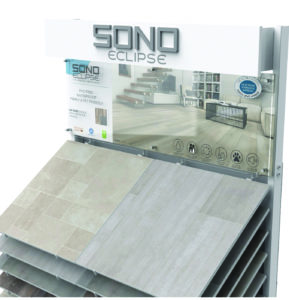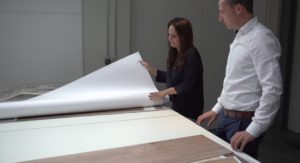
By Reginald Tucker Sample production. It’s one of the most costly and time-consuming aspects of any merchandising support system. First you have to build the actual product(s) to be sampled, and then comes the tedious task of converting those materials onto sample boards that accurately convey the key visual and physical attributes of a particular product. It’s a painstaking process that typically takes several months to plan and, ultimately, execute.
But what if there was a way to dramatically streamline this process and get those samples in the hands of store owners and retail sales associates at a fraction of the time normally required? Thanks to a new innovation unveiled by Inhaus, maker of the German-engineered Sono Eclipse product line, which features a mineral powder core, rapid sample development and deployment is now a reality. Dubbed Fast To Market, or F2M, the state-of-the-art technology allows Inhaus to create sample boards in a matter of a few hours vs. several weeks or months.
How F2M works: Inhaus’ all-digital, high-speed manufacturing process—which is utilized specifically in the production of its brand new waterproof, non-PVC Sono Eclipse product line—prints both the decorative layer and embossed-in-register surface texture. (Inhaus is even able to print the beveled edges into the sample boards.) Designs are generated from production files, and then the samples are printed on the production line at standard production speed on actual material used to make the product.
“The results are amazing,” said Derek Welbourn, CEO of Inhaus, crediting Patrick Pohl, head of design, and Nicole Knospe, design team leader, for spearheading the concept. “We now have a production sample in a 24 x 24-inch piece that is not only real product but also an exact representation of an installation.”

The importance of timely product sample development—particularly in an age where new products from more sources are coming to market at a much faster rate—cannot be overstated, according to Welbourn. While it’s true that more consumers are conducting their initial research for flooring online, many shoppers still crave the tactile experience of handling a physical sample.
“Rarely is a product chosen without an actual sample as it is just impossible to have a final impression of the product without seeing and touching an actual piece,” Welbourn said. “A good sample should inspire customers to imagine using the product for their project.”
Faster sample development is especially critical during the start of key selling seasons. While it’s great to preview new products for store owners and retail sales associates at the main national trade shows and regional events, it’s all for naught if the samples aren’t delivered to distributors and retailers in a timely manner.
“If a new design trend emerges, you have to create a whole new product—something that takes considerable time and investment,” Welbourn explained. “You generally have to wait until the total process is complete before sampling can even start, so from this point on, you are already behind. Or, worse, by the time the new product that you were so excited about is defined, created, produced and sampled, it might not be ‘new’ anymore.”
There’s another significant benefit in generating samples this way, according to Inhaus—improved fidelity and matching when comparing samples to the actual running-line product. “The F2M process is not random; it accurately shows the variation in the design in terms of color and character,” Welbourn explained. “With standard production of samples using random pieces, you can often end up with sample boards that don’t accurately represent an installation. But that’s not the case with our digital process, where we produce 18 unique planks per design. The deliberate design of the digitally made F2M boards eliminates the challenge posed by traditional sampling development.”
Inhaus distributors who have seen the results of the process firsthand approved. “There should be fewer instances where a customer says, ‘I didn’t know about that knot or color range when I saw the product in store,” said Scott Rozmus, CEO of FlorStar, “It really helps ensure the customer has a favorable purchasing experience.”
